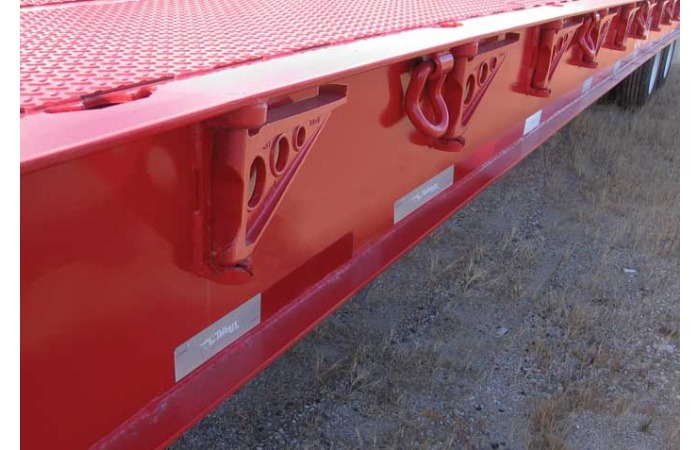
Trailer Maintenance Tips
Start with the purchase
Minimising heavy-haul trailer maintenance starts long before the load hits the road. To ensure long-term durability, choose units with high-strength steel, such as 12-inch deep I-beams with minimum yield strength of 100,000 psi.
High-quality finishes are also important. A trailer with premium primer and topcoat finishes will look great for years to come and will, as a result, have a higher resale value.
Load capacity
To minimise wear on components, such as brakes and tyres, and to ensure safety, follow the right loading capacity for the trailer. This means getting a true idea of load concentrations as well as weight, speed and safety ratings. Manufacturers are great resources for providing a clear picture of each trailer’s true capacity.
Pre-trip inspection
Before taking off with each load, inspect your heavy-haul trailer, checking that brakes and tyres are in good condition. Also ensure tyres are properly inflated to the right psi and confirm hydraulic hoses are free from cracks or damage. If you’re operating a detachable or rear-load model, be sure to properly maintain hydraulic pressure even on self-contained and wet lines.
A quick walk around the trailer to look at the frame, chains and straps for damage is a good idea, as well. Trailers see a lot of use and abuse, particularly in harsher weather conditions, so repairs or replacements could be needed sooner rather than later.
Hydraulic cylinders
Hydraulic cylinders should be fully retracted when not in use to minimise the stainless-steel rams’ exposure to the elements and maximise their longevity.
Lubricate
Keep wheel-ends lubricated to minimise wear and prevent gear oil leakage. Well-lubricated wheel ends also ensure proper and safe operation. Brakes, cams and slack adjusters need to be lubricated, as well. In addition, use dielectric grease on lighting connections, electrical components, lights and lighting harnesses to reduce corrosion. Always refer to the manufacturer’s recommendations and grease guidelines.
Tyres
Traveling with underinflated tyres is one of the biggest culprits of premature wear, so keeping them properly inflated will allow them to last longer and boost fuel efficiency. Regularly check tyre pressure and keep them properly inflated, either manually or with an automatic tyre inflation system.
In addition to keeping tyres inflated, it’s just as important to replace them when they become worn to avoid a blowout and downtime. Always select the right size and rating to ensure optimal performance and keep tyre pressure equalised for the greatest longevity.
Preventative Maintenance Programme
Developing a preventative maintenance programme that aligns with an owner’s business needs will minimise breakdowns and optimise longevity of trailers as well as their components. It also will enhance safety. Trailer fleet owners should match their equipment needs to a maintenance schedule. For example, will the trailer need to be on the road all the time or will it sit idle for longer periods of time?
One of the best ways to see a direct reflection of the success of your maintenance programme is through the Commercial Vehicle Safety Alliance’s inspection programme. The nonprofit organisation scores commercial motor vehicles based on inspection procedures and CVSA criteria — and the lower the number, the better.
Keep a record
Proper record keeping is also important so you know when preventative maintenance is needed and what has already been done. This helps your operation optimise efficiency and prevent any small issues from becoming larger headaches down the road. Putting proper procedures in place will keep appropriate personnel accountable for performing the maintenance when needed.
Training/Mechanics
Trailer owners should ensure anyone involved with any aspect of the trailer’s use has proper training, not only to prevent damage to the trailer, but also for their safety and the safety of others. In addition, ensure mechanics are well-trained on maintaining heavy-haul trailers and that they follow manufacturers’ guidelines.
Communication
Drivers and maintenance technicians should have open lines of communication in regard to trailer issues or required maintenance. This will ensure the right kind of maintenance is performed and that it’s done in a timely manner.
From fleets of five trailers to 50, proper selection, maintenance and preventative programs are equally important in ensuring the greatest longevity, safety and performance of each unit.
Footnote:
ABOUT THE AUTHORS:
Troy Geisler is the vice president of sales and marketing for Talbert Manufacturing. He has more than 15 years of experience in trailer sales, including five years with Talbert. Geisler earned a bachelor’s degree from Purdue University in West Lafayette, Indiana.
Lloyd Hair is the director of maintenance for Keen Transport, a heavy-haul logistic and transportation service provider.


 +91-22-24193000
+91-22-24193000 Subscriber@ASAPPinfoGlobal.com
Subscriber@ASAPPinfoGlobal.com